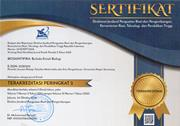Entrepreneurship-Based Biotechnology E-Module Development to Improve Critical and Creative Thinking Skills
(1) Science Education Study Program, Postgraduate Universitas Negeri Semarang, Indonesia
(2) Department of Integrated Science, Faculty of Mathematics and Natural Sciences, Universitas Negeri Semarang, Indonesia
Abstract
Courageous learning triggers learning loss, which is characterized by a decrease in the ability to think critically and creatively. The solution used with innovation in learning media is the e-model of entrepreneurship. This study aims to test the feasibility of entrepreneurship-based biotechnology e-modules and improve students' critical and creative thinking skills after using this e-module. This research and development (R&D), which applies the 4D model (Define, Design, Develop, and Dissemination). The study consisted of 31 class IXA students of yunior high school. The research instrument consisted of expert validation questionnaires, pretest-posttest questions, and student response questionnaires. The analysis of the validation questionnaire for material and media experts produced an average score quite high with the appropriate criteria for use in classroom learning. The results of the t-test for students' critical and creative thinking skills yield a significant value of 0.0 which is smaller than 0.05, which means that there is a significant difference between students' critical and creative thinking skills in the pretest and post-test. Analysis of the N-gain value of students' critical and creative thinking abilities shows an average result of 0.46. This result is included in the category of moderate improvement, which means that the increase in students' critical and creative thinking skills is in the medium category. This e-module also has a very good response from all students. Based on the results of these analyses, the entrepreneurship-based biotechnology e-module is declared feasible for use in learning and can improve students' critical and creative thinking abilities.
Keywords
Full Text:
PDFReferences
Álvarez-Huerta, P., Muela, A., & Larrea, I. (2022). Disposition toward critical thinking and creative confidence beliefs in higher education students: The mediating role of openness to diversity and challenge. Thinking Skills and Creativity, 43(December 2021). https://doi.org/ 10.1016/j.tsc.2022.101003
Asi, M., Retnoningsih, A., & Irsadi, A. (2021). Effectiveness of Interactive E-Book Global Warming and Climate Change Integrated Socio Scientific Issues Peat Ecosystem. Jurnal Penelitian Pendidikan IPA, 7(SpecialIssue), 240–244. https://doi.org/10.29303/jppipa. v7ispecialissue.1039
Astuti, N., Kaspul, K., & Riefani, M. K. (2022). Validitas Modul Elektronik “Pembelahan Sel” Berbasis Keterampilan Berpikir Kritis. Jurnal Eksakta Pendidikan (Jep), 6(1), 94–102. https://doi.org/10.24036/jep/vol6-iss1/667
Dewi, A. P. (2019). Implementasi Lembar Kerja Peserta Didik (LKPD) berbasis Science, Technology, Engineering, and Mathematic (STEM) Pada Materi Usaha dan Energi Untuk Meningkatkan Kemampuan Berfikir Kritis Di SMA Muhammadiyah 7 Yogyakarta. Journal Pendidikan Fisika Univeristas Ahmad Dahlan.
Diantari, L. P. E., Damayanthi, L. P. E., & Sugihartini, N. (2018). Pengembangan E-Modul Berbasis Mastery Learning Untuk Mata Pelajaran KKPI Kelas XI. Janapati, Jurnal Nasional Pendidikan Teknik Informatika, 7(2), 33–48. https://doi.org/http://dx.doi.org/10.23887/janapati.v7i1.12166
Haka, N. B., Majid, E., & Pahrudin, A. (2021). Pengembangan e-modul android berbasis metakognisi sebagai media pembelajaran biologi kelas XII SMA/MA. Edu Sains Jurnal Pendidikan Sains & Matematika, 9(1), 71–83. https://doi.org/10.23971/eds.v9i1.2155
Hasanah, M., Supeno, & Wahyuni, D. (2023). Pengembangan E-Modul Berbasis Flip Pdf Professional untuk Meningkatkan Keterampilan Berpikir Kreatif Siswa pada Pembelajaran IPA. Tarbiyah Wa Ta’lim: Jurnal Penelitian Pendidikan Dan Pembelajaran, 10(1), 44–58.
Irwansyah, F. S., Lubab, I., Farida, I., & Ramdhani, M. A. (2017). Designing Interactive Electronic Module in Chemistry Lessons. Journal of Physics: Conference Series, 895(1). https://doi.org/10.1088/1742-6596/895/1/ 012009
Kencanawaty, G. (2016). Pengaruh Metode Pembelajaran Kooperatif Dan Minat Belajar Terhadap Kemampuan Berpikir Kritis Matematika Siswa. Research and Development Journal of Education, 2(2). https://doi.org/ 10.30998/rdje.v2i2.1425
Khotimah, K., Ar, E., & Muspiroh, N. (2016). Penerapan Pembelajaran Bioentrepreneurship Pada Sub Konsep Pisces Untuk Meningkatkan Hasil Belajar Siswa Kelas X Di SMA Negeri 1 Plumbon. Scientiae Educatia: Jurnal Sains Dan Pendidikan Sains, 5(1), 39–47.
Kimianti, F., & Prasetyo, Z. K. (2019). Pengembangan E-Modul Ipa Berbasis Problem Based Learning Untuk Meningkatkan Literasi Sains Siswa. Kwangsan: Jurnal Teknologi Pendidikan, 7(2), 91. https://doi.org/10.31800/ jtp.kw.v7n2.p1--13
Kristanti, E. A., Bintari, S. H., & Ridlo, S. (2012). Pengembangan Perangkat Pembelajaran Bioentrepreneurship Pembuatan Makanan Dari Limbah Cair Pengolahan Kedelai. Journal of Innovative Science Education, 1(1), 1–9.
Latifah, N., Ashari, & Kurniawan, E. S. (2020). Pengembangan e-modul Fisika untuk Meningkatkan Kemampuan Berpikir Kritis Peserta Didik. Jurnal Inovasi Pendidikan Sains, 01(01), 1–7.
Linda*, R., Zulfarina, Z., Mas’ud, M., & Putra, T. P. (2021). Peningkatan Kemandirian dan Hasil Belajar Peserta Didik Melalui Implementasi E-Modul Interaktif IPA Terpadu Tipe Connected Pada Materi Energi SMP/MTs. Jurnal Pendidikan Sains Indonesia, 9(2), 191–200. https://doi.org/10.24815/jpsi.v9i2.19012
Mardiyah, F. H., Purwianingsih, W., & Solihat, R. (2022). Penggunaan Modul Elektronik Berbasis Isu Sosiosaintifik untuk Meningkatkan Persepsi Siswa tentang Bioteknologi. Bioscientist : Jurnal Ilmiah Biologi, 10(1), 510. https:// doi.org/10.33394/bioscientist.v10i1.5402
Mijaya, N. P. A. P., Sudiatmika, A. A. I. A. R., & Suardana, I. N. (2021). Pengembangan e-Modul Pembelajaran IPA SMP Kelas VII Berbasis Model Pembelajaran Levels of Inquiry untuk Meningkatkan Literasi Sains Siswa. Quantum, 12(2), 220–237.
Nufaizah, S. T. (2019). The Effectiveness of Student Worksheet Based on Bioentrepreneurship in Conventional Biotechnology Material to Train Creative Thingking Skills. BioEdu Berkala Ilmiah Pendidikan Biologi, 8(2), 208–217.
Nugraha, A. (2015). Penggunaan e-module pembelajaran pada konsep sifat koligatif larutan untuk mengembangkan kemampuan literasi kimia siswa: penelitian kelas terhadap siswa kelas XI F 2 SMK Farmasi As-shifa Ciparay (Doctoral dissertation, UIN Sunan Gunung Djati Bandung). https://etheses.uinsgd.ac.id/14183/
Nurseto, T. (2011). Membuat Media Pembelajaran yang Menarik. Jurnal Ekonomi & Pendidikan, 8(1), 19–35.
Ratna Suminar. (2017). Penyusunan modul bioteknologi sma kelas xii berbasis uji potensi bakteri amilolitik dari limbah pabrik tepung tapioka di desa tajug kabupaten ponorogo 1,2,3). Jurnal Simbiosis II, 2(4), 46–53.
Sinaga, H., & Anas, N. (2022). Development of Student Worksheets Based on Critical Thinking Biotechnology Materials for Third Grade (IX Class) of Junior High School. Jurnal Pembelajaran Dan Biologi Nukleus, 8(2), 355–363. https://doi.org/10.36987/jpbn.v8i2.2761
Scarborough, Norman M dan Thomas W Zimmerer. (2008). Essentials of. Entrepreneurship and Small Business Management 5th Edition.New Jersey : Pearson Education International.
Suwatra, W., Suyatna, A., & Rosidin, U. (2018). Development of Interactive E-Module for Global Warming to Grow of Critical Thinking Skills. International Journal of Advanced Engineering, Management and Science, 4(7), 543–549. https://doi.org/10.22161/ijaems.4.7.7
Tambunan, N. (2016). Pengaruh Strategi Pembelajaran dan Minat Belajar Terhadap Kemampuan Berpikir Kreatif Matematis Siswa. Formatif: Jurnal Ilmiah Pendidikan MIPA, 6(3), 207–219. https://doi.org/10.30998/ formatif.v6i3.993
Wulandari, D. (2017). Efektivitas model pembelajaran guided inquiry terhadap kemampuan berpikir kritis dan keterampilan proses sains siswa kelas XI IPA SMA materi sistem respirasi (thesis, UNY Yogyakarta) https://eprints.uny.ac.id/53594/
Yulianci, S., Nurjumiati, N., Asriyadin, A., & Adiansha, A. A. (2021). The Effect of Interactive Multimedia and Learning Styles on Students’ Physics Creative Thinking Skills. Jurnal Penelitian Pendidikan IPA, 7(1), 87–91. https://doi.org/10.29303/jppipa.v7i1.529
Refbacks
- There are currently no refbacks.

This work is licensed under a Creative Commons Attribution 4.0 International License.


